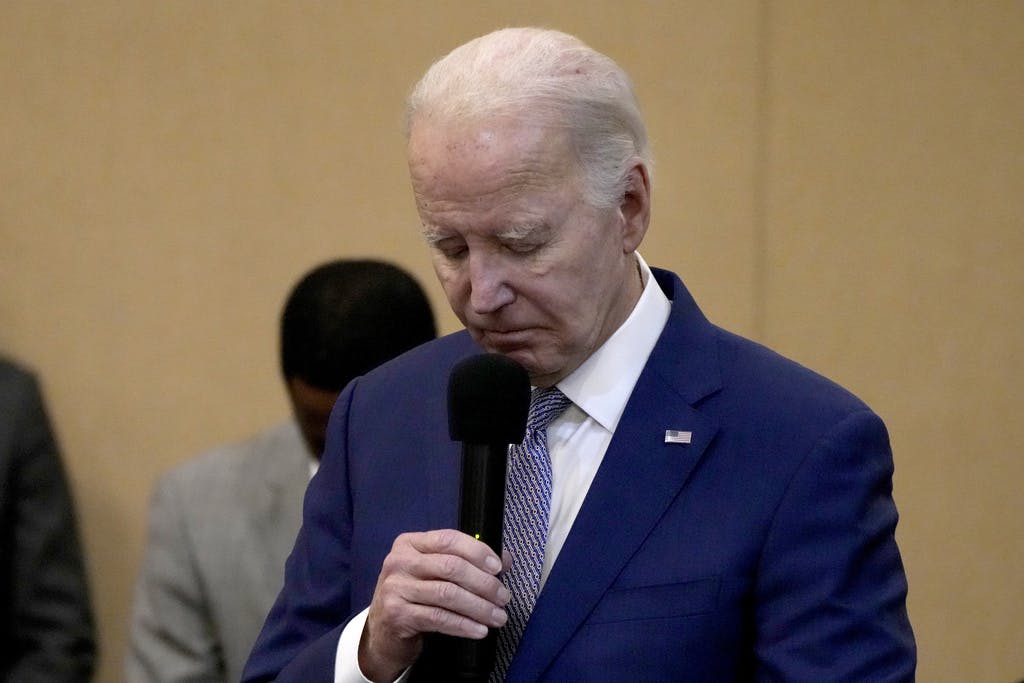Stuck Between Iran Hawks and Appeasers, Biden Sends Conflicting Messages After Deadly Attack on American Troops
Possible targets for retaliation after three Americans are killed include bases inside Iran, assassination of Islamic Revolutionary Guard Corps commanders in or outside the country, or hitting an array of proxy groups.

Following a deadly attack on American troops, President Biden is torn between advocates of appeasing Iran, who seem closest to his own cautious instincts, and hawks who say a strike at the Islamic Republic is long past due.
A day after three Americans stationed at a Jordanian outpost near the Syrian-Iraqi border were killed in a drone strike, the Biden administration is sending conflicting messages. While some officials vow to respond, others are careful to avoid blaming Iran directly.
Possible targets for retaliation include bases inside Iran, assassination of Islamic Revolutionary Guard Corps commanders in or outside the country, or hitting an array of proxy groups. As of yet, response to more than 150 attacks by these proxies has been sporadic, and has failed to deter further strikes against Americans.
The White House is adamant not to “telegraph” any response beyond Mr. Biden’s statement that America will act “at a time and in a manner of our choosing.” Mr. Biden’s overarching policy since the Hamas terrorist attacks of October 7 has been to avoid “escalation,” and especially a direct confrontation with the Islamic Republic.
“We’re not looking for a war with Iran,” the national security council’s spokesman, John Kirby, said Monday. Yet, he added, groups like the ones that killed the Americans Sunday are “backed by Iran,” and Tehran is “certainly not discouraging” their attacks.
American troops in the Mideast are under constant attack as they fight ISIS in Iraq and Syria and strive to keep the Red Sea open for commercial shipping. “We may not be at war with Iran, but make no mistake, Iran is at war with us,” a former secretary of state, Mike Pompeo, said Monday.
In a first public appearance since his December hospitalization, Secretary Austin expressed “outrage and sorrow” Monday over the deadly drone strike, adding that he and the president “will not tolerate attacks on U.S. forces and we’ll take all necessary actions to defend the U.S. and our troops.”
An unidentified Pentagon official told the Wall Street Journal, though, that “the U.S. has yet to find evidence thus far that Iran directed the attack.” That formulation is reminiscent of a post-October 7 debate over the extent of Tehran’s involvement in the Hamas atrocities in Israel.
Like then, some voices in Washington are now attempting to exonerate Iran and to blame Israel instead. American troops “didn’t die defending U.S. interests, they died defending Biden’s refusal to press Israel for a ceasefire,” the Quincy Institute’s co-founder, Trita Parsi, writes. “Their lives were put at risk by Biden to defend Israel’s ability to continue its carnage in Gaza.”
Mr. Parsi echoes Tehran’s own quick denial of involvement in the Sunday attack. “The groups in the region do not take orders from Iran,” the Iranian foreign ministry spokesman, Nasser Kanaani, said. “An immediate cease-fire in Gaza can lead to the return of peace.”
Yet, Hamas fired the first shot in the current war, and it is but one link in a “ring of fire” — semi-military forces that the Islamic Revolutionary Guard Corps established in Lebanon, Syria, Iraq, and Yemen to surround Israel as part of the Islamic Republic’s war against Israel and the West.
The Sunday attack “isn’t merely state sponsorship of terrorism — it is an act of war,” the chairman of United Against Nuclear Iran, Joseph Lieberman, and CEO, Mark Wallace, said in a statement Sunday, adding that “dozens of attacks against U.S. military personnel have gone unanswered” by Mr. Biden.
Administration officials have fingered an Iran-backed force in Iraq, Kataib Hezbollah, as the most likely suspect behind the attack. If so, one target for Western retaliation could be “Abdul Reza Mesgarian, the commander IRGC Quds Force Ramadan HQ, which oversees Quds Force operations in Iraq,” UANI’s policy director, Jason Brodsky, writes on X.
Senator Graham of South Carolina said Sunday that America must now “strike targets of significance inside Iran.” Others advocate hitting militia bases and commanders in Iraq, Syria, and Yemen.
Despite numerous Iranian-backed militia attacks on Americans, “the Biden administration limited any responses to those proxies,” Senator Cruz said in a statement. He noted that the mullahs were deterred after the 2020 killing of the IRGC commander, Qasem Soleimani.
The current administration, Mr. Cruz added, retracted that era’s policies of maximum pressure on Iran. “These deliberate, explicit choices by Joe Biden and Biden officials directly led to this weekend’s attack, and they should all be reversed immediately,” he said.

